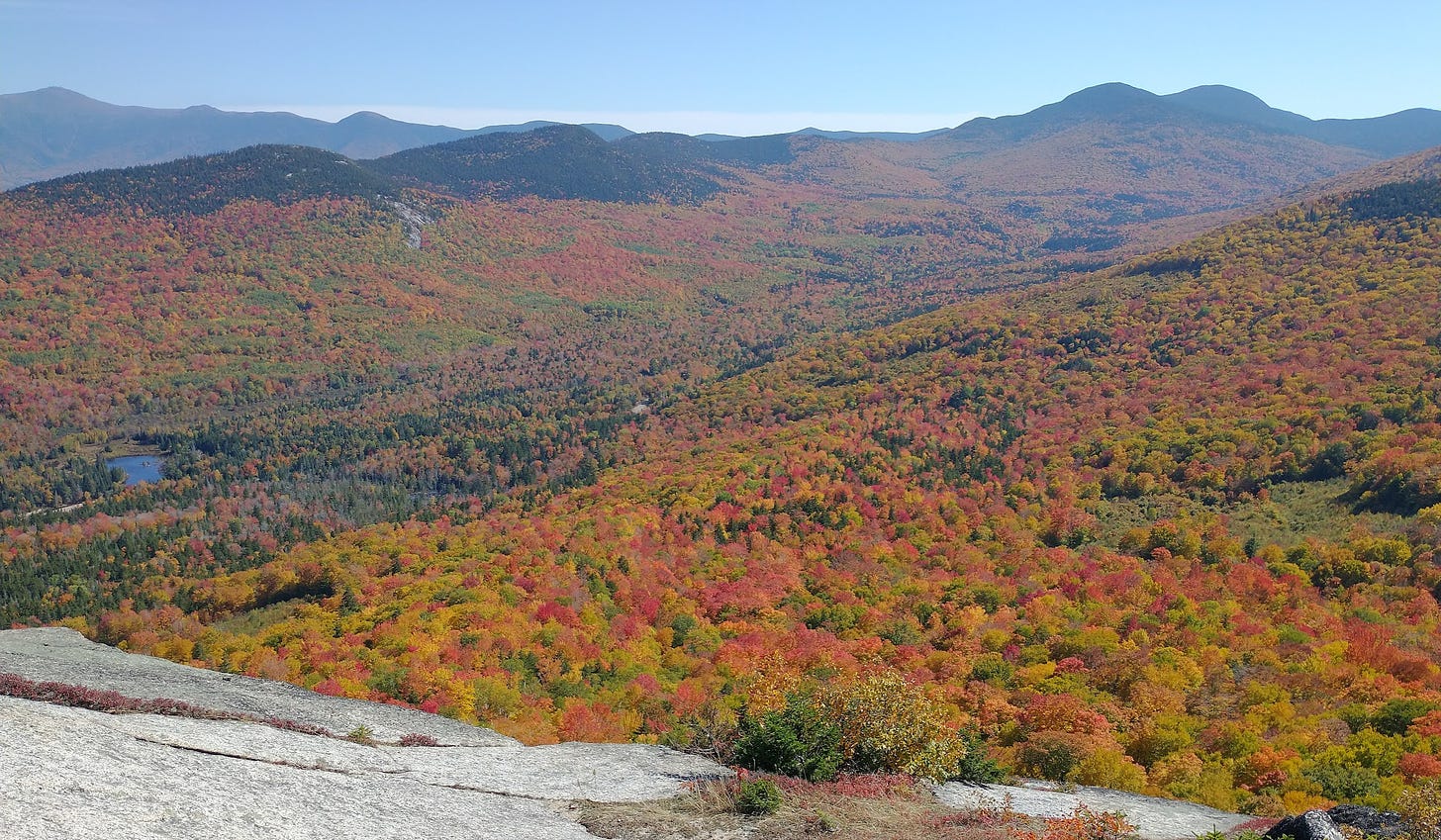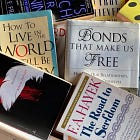The Time My Noisy Mind Drowned Out Fall's Beauty
The quality of our lives and, thus, the quality of civilization depends upon the amount of time we decide to spend in our right mind.

I can’t count the times I thought I had a profound insight and believed it would lead to a permanent shift in my mindset. I know now that shortly after such realizations, life will say, "Oh, yeah, let’s see how you react to this."
That is the nature of progress. We cannot measure our progress. Why? Through our study of Bonds That Make Us Free and Meditations, we have been learning we have a right mind and a wrong mind and the ability to choose between the two.
The quality of our lives and, thus, the quality of civilization depends upon the amount of time we decide to spend in our right mind. I write decide because, despite how it seems, circumstances do not determine our mindset.
Both the wrong mind and the right mind are maximal mindsets. Slip back into the wrong mind, and you will be dismayed to feel it is as though you never left.
So where is progress found? Progress is found when we stop justifying our choice to luxuriate in the blaming nature of our wrong mind. Progress is found when we are in our wrong mindset and say, "Not this."
The late minister and author Hugh Prather used this analogy, which has stuck with me for decades. In a sermon, he said, People, if you were in your car and had to throw up, you wouldn’t keep driving. You would pull over to the side of the road and attend to your bodily needs. He continued, My friends, I ask you to make the same effort when you find yourself in your wrong mind. Attend to it; don’t keep running with its insane advice. (I’m loosely remembering Hugh’ words, not quoting him.)
I wrote the following essay back in 2010. I want to think I have made some progress over the fourteen years since. Progress doesn’t mean wrong-minded thinking won’t trip me up again. If I choose my wrong mind, I will trip up again. Progress means that when it happens, I will choose again more quickly.
Today, more often than we realize, we will have opportunities to choose again. The quality of our lives depends more upon our willingness to choose again than on the impossible task of not making errors in the first place.
The fall colors were peaking as we set out for a half-day hike to the ledges overlooking Lake Solitude in New Hampshire. The ledges sit on the shoulder of Mount Sunapee, almost even at the elevation of the summit.
An auto road goes to the Mount Sunapee summit, and from there it is an easy walk to the ledges. As we hiked up from the base of the mountain, we had the trail to the ledges to ourselves. Arriving at the ledges we were met with a crowd of people who had driven to the summit.
Having found a spot to sit, we began eating lunch when a party of parents and children arrived. Soon, they were shouting boisterously, thrilled with the echoing sounds of their voices and the attention they drew from campers standing on the beach of the lake several hundred feet below. Another hiker politely requested that they be quiet, but they continued shouting.
My mind began to react against this intrusion. Trying to act non-judgmentally, I resisted the urge to turn around to see who was shouting. The economist in me began to reflect upon incentives: “That’s the kind of behavior you get,” I told myself, “when you make things too easy for someone. They don’t appreciate hikers' etiquette because they arrive by automobile. They didn’t earn the view the hard way.”
Yes, I felt superior. And if I was special, those shouting were different from me. After all, we had hiked up; they drove up. We were entitled to peace and quiet. They had earned my righteous judgment.
In truth, I was making as much noise as the “offending party.” Although the noise was in my head, I mentally contributed to the less-than-peaceful atmosphere on the ledges. When we selected the hike, we knew that our viewing place would be accessible to non-traditional hikers. Feeling miserable, I was making myself out to be blameless. But was I blameless? Was I holding others to a higher standard than I was myself?
My wrong mind was full of judgments. I was resisting the humanity of those I was judging, as well as my own humanity. I reacted not only against the noise but also against my judgments about the noise. “Why wasn’t I past judging others?”I wondered.
I was condemning the shouters and then condemning myself for judging the shouters. It was as though my finger was caught in a Chinese puzzle—the more I judged those shouting, the more I judged myself for failing to let it go.
Seen correctly, judgment is a defense against the choice for the right mind. The more we judge, the more the peace we claim we want seems elusive. The defenses of our wrong mind seem foolproof; we choose against our right mind and then blame others for our decision.
We were again alone as we set out to hike back down the mountain. My mind was still making noise. Turning to my wife, I said, “I can’t believe those parents allowed their children to make so much noise.” My wife, who judged less but observed more, replied, “It was the parents who started the shouting, not the kids.” I chuckled at this new information.
How many times had I behaved rudely and yet was utterly oblivious to what I was doing? Even that day, I was as ignorant as the boisterous ones. I was insisting I was superior. The problem was not as I had set it up. I was not the innocent victim that I pretended to be.
Could things have gone differently? Indeed, they could have. I failed, not because I reacted with judgment, but because I judged my judgments. I had failed to let go of my judgments because I skipped a necessary step. I had not been willing to see the humanity in others because I was not willing to see my humanity.
The way out of my mental misery was to mindfully begin where I was. I had reacted to the noise; it would be foolish to pretend otherwise. But I could have chosen to be aware of what my mind was doing and then forgiven myself for feeling special, for focusing on superficial differences.
Clearly, I had erected barriers to interfere with my enjoyment of the day; but I didn’t want to see those barriers. To be more precise, I was looking at my internal barriers; but I was looking with resistance and judgment. And, looking with resistance and judgment is not looking at all.
By not looking at my mind’s antics without judgment, I missed an opportunity for the root cause of what I was feeling to be revealed. I had given away my power to choose. I had falsely accused those shouting on the ledges of robbing me of my peace. In truth, I robbed myself of my peace by my desire to feel different from those I labeled as “rude hikers.”
By staying stuck, I also missed opportunities to respond to what the day asked of me. Perhaps I could have genuinely delighted in the enthusiasm of those who may have been looking at a mountain view for the first time. Alternatively, a polite conversation about hiker etiquette may have been in order. Or maybe it was no big deal at all; if I had dropped my resistance to the noise, it may have faded into the background.
On that day on the ledges, I was invested in seeing superficial differences that I had made up. The antidote was to look at my antics without judgment and laugh gently at myself.
Reciting a spiritual truth such as “there is a great web of life that connects us all” is not a path to peace as long as I am unwilling to look and realize the truth for myself. A child may go on believing there is a monster under the bed, even when his parents go first to look. He has to look under the bed for himself. I was not past believing in a monster (reacting to the noise and then condemning myself for doing so), and it would be foolish to pretend otherwise.
The real noise at Lake Solitude was in my mind, not the world. That day on the ledges, beyond superficial differences, we were all the same. They were shouting into the open space; I was shouting in my mind.
There is a lesson for life here—a lesson that I’ve found hard to learn. To get to the peace inside, I had first to look, without judgment, at what was not peaceful in my mind. As with the Chinese finger puzzle, as we take our ego a little less seriously, our mind is freed from its trap.
Resistance, judgment, and comparisons are foolproof ways to create misery for ourselves. This is not Kumbaya advice. In our right mind, we can discern without the added noise of righteous judgment.
I never met a mind that didn’t judge… What makes some humans stand out from others is that they don’t let their judging minds push their behavior around. —David K. Reynolds
A reader recently honored me with this note: “That was a fantastic column, Barry. You consistently take me on a path that encourages me to think for myself, to do the right thing, and to live the kind of life I know I’m supposed to live. Surrounding myself with people like yourself and Bari Weiss gives me great hope. Thank you so much for what you do."
If my essays make a difference for you, I hope you join Martin in supporting this Substack. Your paid subscription helps make these essays possible and gives you immediate access to Mindset Shifts U. Thank you.



Very insightful.
Wonderful post. I doubt if any of us can rid ourselves of a noisy mind but perhaps we should aim for a more joyful noise! Sunapee brings back memories.